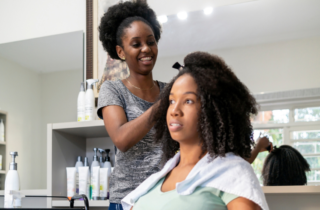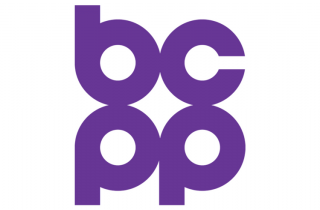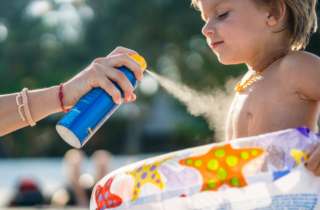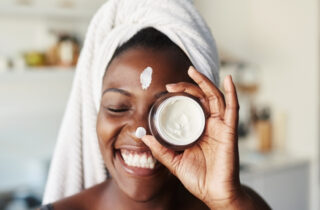Procter and Gamble Announces New Fragrance Ingredient Disclosure Policy
FOR IMMEDIATE RELEASE
AUGUST 30, 2017
CONTACT:
Janet Nudelman, Breast Cancer Prevention Partners, (415) 279-1473
Erika Wilhelm, Breast Cancer Prevention Partners
SAN FRANCISCO, Calif.— Procter and Gamble officially joined the race to the top for fragrance ingredient disclosure. The multinational giant announced an ambitious, new fragrance transparency policy for its consumer product portfolio, including beauty and cleaning products. By 2019, P&G pledged to begin disclosing the “secret” fragrance ingredients in over 2000 of its beauty, fabric, home and feminine hygiene products in the U.S. and Canada. P&G’s fragrance ingredient disclosure will occur both online and through the SmartLabel™ app and will include the fragrance ingredients in a product’s formulation above 0.01% (100 parts per million).
Procter & Gamble is home to some of the world’s most iconic and recognizable beauty and cleaning product brands including Olay, Head & Shoulders, Herbal Essences, Tide, Febreeze, Dawn and Tampax. According to P&G, after they meet their initial 2019 goal, they will expand into other product categories and into the other 180 countries where they do business.
“This is a tremendously important step forward toward full ingredient disclosure for the world’s biggest consumer products company,” said Janet Nudelman, Director of Program and Policy at Breast Cancer Prevention Partners. “For over a decade our Campaign for Safe Cosmetics and its hundreds of thousands of supporters have been urging P&G and its beauty brands to practice a higher level of ingredient safety and transparency. Kudos to P&G! This is exactly the kind of disclosure consumers are demanding and precisely the kind of information they need to make safer and more informed purchasing decisions for themselves and their families,” Nudelman said.
P&G has now joined a small but impressive group of industry leaders that have voluntarily adopted fragrance ingredient disclosure policies given the lack of federal regulation in this arena. Small, natural beauty brands in the cosmetics industry were first to adopt fragrance ingredient disclosure policies followed by trailblazers in the cleaning product industry such as Seventh Generation and SC Johnson.
For major multinationals that sell both personal care and cleaning products, Unilever was the first to announce product-specific fragrance ingredient disclosure earlier this year. Although Unilever beat P&G’s announcement by about 6 months, and their policies and initial commitments are virtually identical, Procter & Gamble’s fragrance initiative will ultimately apply to a much broader swath – and number – of consumer products given the size of the company and the breadth of their commitment.
Personal care product companies are not required by law to provide full ingredient disclosure to consumers or regulators. As a result, consumers get incomplete information regarding the ingredients in their beauty products and the FDA is unable to determine the full scope of ingredients on the market being used to formulate cosmetic products. Many major multinational cosmetic companies — and their trade associations — are desperately trying to hold on to this special privilege, even as other industries and fragrance suppliers have become more transparent about the ingredients in their products. There are virtually no federal requirements for disclosure of any ingredients in cleaning products.
Because of this labeling loophole, any cosmetic or cleaning product containing “fragrance” – a word representing a tightly held secret mixture that can range from a dozen to up to hundreds of ingredients – can contain carcinogens, endocrine disruptors, neurotoxicants, sensitizers, allergens, respiratory irritants, and environmental toxicants. Hair products represent a buyer beware situation: more than 95 percent of shampoos, conditioners, and styling products contain fragrance.
“Without federally or state mandated fragrance ingredient disclosure,” Nudelman said, “it is impossible for consumers to avoid carcinogens, allergens and other problematic ingredients in the cosmetics and personal care products they use every day. This lack of disclosure also makes it impossible for regulators to fully understand – and protect the public from – the myriad of unsafe chemicals being used to formulate cosmetic products.”
It’s a fragrance ingredient disclosure race to the top! How the major multinationals and some of the smaller industry leaders stack up:
Personal Care
In the beauty/personal care product space, over 150 companies fully disclose fragrance ingredients on their product label including industry leaders such as Beauty Counter, Aubrey Organics, California Baby, EO Products, Herban Lifestyle, Honeybee Gardens, Intelligent Nutrients, Iredale Mineral Cosmetics, Juice Beauty, Osea International, ThinkBaby, True Nature Botanicals, W.S. Badger Company, Inc., Yes To, Inc. and Waleda.
Cleaning Products
Seventh Generation. In 2008, Seventh Generation became the first home care company to voluntarily provide consumers with full fragrance ingredient disclosure on their product labels and online.
SC Johnson. In 2015, SC Johnson became the first major multi-national company to disclose product specific fragrance ingredients in its cleaning products providing disclosure of more than 99.9% of ingredients in most of their product categories. In 2016, SC Johnson launched a new Glade air freshener collection with 100% fragrance ingredient disclosure. Last month, the industry giant announced its plans to disclose, also on a product-specific basis, the presence of 368 potential skin allergens that may occur in its products. By 2018, these allergens will be disclosed online on a product-specific basis. This move goes beyond existing regulations in the European Union and is far more aggressive than U.S. mandates, where there are no rules requiring fragrance allergen disclosure.
Personal Care and Cleaning Products
Unilever. In February, 2017, Unilever announced it would voluntarily expand its current ingredient disclosure also through the SmartLabel™ program to include the fragrance ingredients present in a personal care product at or above 0.01% (100 parts per million/ppm). Unilever SmartLabel™ updates are due to be complete by the end of 2018. Additionally, Unilever will also be disclosing the EU designated 26 fragrance allergens on personal care product labels of their entire U.S. personal care portfolio of 1800 products – this is already legally mandated in the European Union. The Unilever announcement applies to both its personal care and cleaning products sold in the U.S. and the European Union.
More about P&G’s announcement can be found here:
https://www.bloomberg.com/news/articles/2017-08-30/p-g-to-list-fragrance-ingredients-as-part-of-transparency-pushhttp://news.pg.com/press-release/pg-corporate-announcements/pg-expands-transparency-commitment-include-fragranceingred
###
Breast Cancer Prevention Partners (BCPP) is the leading national science-based policy and advocacy organization working to prevent breast cancer by eliminating our exposure to toxic chemicals and radiation.
Types: Press Release




